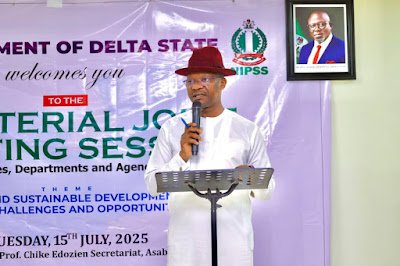Delta State is on the verge of an economic revolution as Governor Sheriff Oborevwori’s administration intensifies efforts to expand renewable energy access across rural communities. According to the State Commissioner for Works (Rural Roads) and Public Information, Charles Aniagwu, the initiative will create thousands of jobs, boost small businesses, and power schools and hospitals that have long struggled without steady electricity.
Speaking in Abuja during the 14th State-by-State Roundtable Engagement between the Rural Electrification Agency (REA) and Delta stakeholders, Aniagwu explained that the state’s renewable energy roadmap was strategically designed to close the gap between urban and rural development. He stressed that the project is not just about lighting up villages but about transforming livelihoods.
“Once rural communities are electrified through solar and other renewable sources, barbers, hairdressers, vulcanizers, dry cleaners, and other entrepreneurs will break free from the financial burden of generators. That money will be reinvested into their businesses, leading to expansion and job creation. There is a direct link between clean energy and prosperity,” Aniagwu said.
He noted that reliable electricity would also revitalize schools and health facilities that currently function under dire conditions. With renewable power, classrooms, libraries, and laboratories will thrive, while hospitals will be able to preserve drugs and vaccines, operate theatres effectively, and provide uninterrupted healthcare services.
Read Also:
- Oborevwori champions clean energy at Macao IIICF, eyes waste-to-energy projects for Delta State
- How Delta is charting path to an inclusive blue economy
- Mainpower Disco files petition to EERC, seeks immediate suspension of new tariff order
Aniagwu emphasized that off-grid renewable solutions were the smartest and most cost-effective option for far-flung communities. Mini-grids, he said, would eliminate the heavy costs of building long transmission lines while also reducing the risks of vandalism on power infrastructure.
Already, Delta State has begun deploying renewable energy in select hospitals, with more projects in the pipeline as private investors show keen interest in partnering with the government. Aniagwu assured that the initiative would continue to expand, with long-term benefits that include safety, inclusiveness, and economic empowerment.
“Renewable energy is not just about electricity, it is about jobs, growth, and inclusiveness,” he stated. “Our rural brothers and sisters will no longer remain spectators in the economy. They will be active participants in building a stronger, more prosperous Delta.”
The state government believes that with renewable energy at the heart of rural transformation, Delta’s economy will witness a historic shift, ushering in an era of sustainable growth that leaves no community behind.






